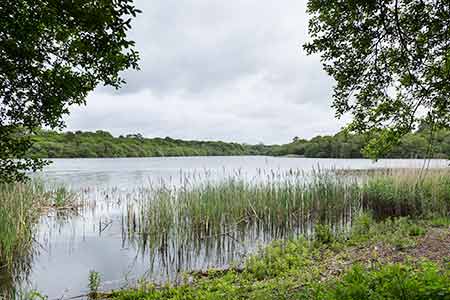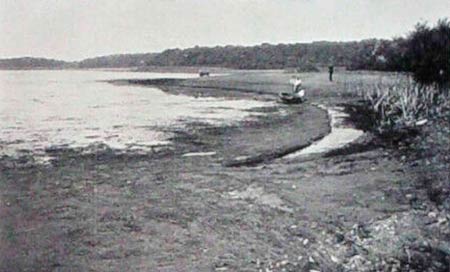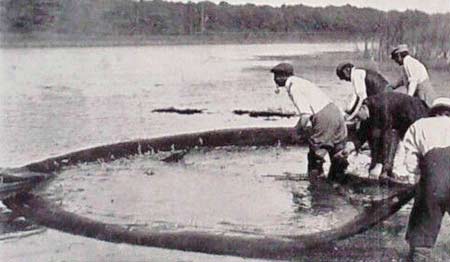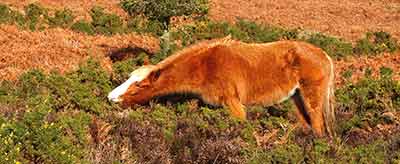Sowley Pond, Hampshire
Sowley lies close to the Solent and around 3 kilometres (2 miles) from Beaulieu village. It is in the south-western corner of the parish and until 1958, when Sowley House and the Sowley Estate were sold off, was also at the south-western edge of the Beaulieu Estate.
It's a tiny hamlet, or maybe not even a hamlet, that motorists on its one minor public road would miss altogether if they blinked when passing through. Similarly, walkers along the long-distance Solent Way, which passes by on the same minor road, would probably be unaware of its existence if it were not for Sowley Pond on the northern side of the road. Even this, however, is largely screened by trees, shrubs and other vegetation.
But Sowley boasts a fascinating history that from the 11th until the 16th century was inextricably linked with the monks of Beaulieu Abbey; from the late 16th century until the early 19th century, somewhat incongruously, featured substantial industrialisation; and almost inevitably was the home of smugglers.
(1) Sowley Pond

Sowley was the site of one of Beaulieu Abbey's granges, a network of outlying farms created to generate income and provide food to help support the abbey's Cistercian monks. All were operated to greater or lesser extent by the monks, assisted by lay-brothers - non-ordained members of the abbey - and local villagers.
But perhaps the monk's most distinctive contribution to the landscape was Sowley Pond, called in the Abbey charters Colgrimesmore and Frieswater, or Freshwater, created as a shallow fish pond in 1270 by the building a causeway that dammed the Crockford Stream - a modest watercourse that rises on Beaulieu Heath and joins the Solent a little to the south of Sowley Pond - and another small stream that coalesced nearby.
(A lime kiln belonging to a nearby settlement was apparently flooded in the process, but the monks were never afraid of upsetting the locals).
Following the Dissolution of the Monasteries, Sowley Pond became part of the Beaulieu estate, owned originally by Thomas Wriothesley, and to some extent, has remained a peaceful backwater ever since, although it was extended in the 17th and 18th centuries to supply water power to the nearby ironworks.
(2) A scheme to drain Sowley Pond

A degree of national interest was aroused in 1907 when the pond was drained so as to, according to local historian Susan Tomkins, remove pike that were playing havoc with an established trout fishery.
The Illustrated London News (September 21st, 1907) showed somewhat grainy images of the pond before drainage, and again after water had been running away for over 12 hours. Lord Montagu of Beaulieu is seen examining some of the coarse fish caught and there is a view 'across the flooded country after the dam burst'.
The ILN had a slightly different take on the story, though, reporting: 'Lord Montagu of Beaulieu is draining Sowley Pond, the largest lake in Hampshire, which covers about 100 acres, in order that the coarse fish may be taken from it, and trout substituted for them. Lord Montagu is selling the best of the catch - pike, carp, tench, perch bream and roach - to those who wish to re-stock their own waters'.
(No mention was made of what was to happen to the remainder of the catch).

And in true newspaper style that it is easy to imagine only as a modern phenomenon, the report went on to add:
'Legend has it that 600 years or so ago a life size golden figure of the Virgin and Child was thrown into the lake by the monks, who were in urgent need of a safe hiding place for it. This story has of course lent additional interest to the work of draining'.
Almost needless to say, no such statue was found, or if it was, the discovery was kept a closely guarded secret.
(3) Sowley Pond wildlife
Today, despite being used to provide irrigation for nearby farms and for low intensity coarse fishing - what happened to the re-stock with trout I do not know - the pond is a haven for wildlife, maybe in part because lack of public access reduces the potential for disturbance.
It is the largest body of standing water in the region and has records for the only known breeding population of variable damselfly in the New Forest. It is also designated as a Site of Special Scientific Interest (SSSI) for ducks and other wetland birds.

The waterside woodland was once home to what was described as the largest heronry in Hampshire that in 1984 held 60 occupied nests.
That honour, however, has been relinquished and the Sowley heronry from 2009 to 2017 averaged a more modest 12 occupied nests, interspersed in some years with the nests of a small number of little egrets.
Reported wildfowl counts of note in recent years included 700 teal in January 2017, 170 teal in January 2016, 12 Goosanders in January 2017 and 20 pochards in March 2016.
Note: There is no public access to Sowley Pond.
Find out more about Sowley's fascinating history
References:
Illustrated London News
An Album of Old Beaulieu: Susan Tomkins
New Forest Catchment Partnership presentation by Dr Naomi Ewald
Hampshire Ornithological Society Bird Reports
Various Wikipedia pages
Quick links
More links
Other related links
Search this site

